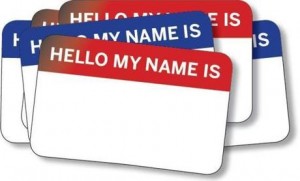From the Book of Daniel:
Daniel, who was called Belteshazzar, was severely distressed for a while.
(From the Daily Office Lectionary – Daniel 4:19a (NRSV) – April 15, 2013.)
 This renaming of Daniel by King Nebuchadnezzar intrigues me. Earlier in chapter 4, Nebuchadnezzar explains that Daniel “was named Belteshazzar after the name of my god” apparently because the king believed Daniel to be “endowed with a spirit of the holy gods.” (v. 8)
This renaming of Daniel by King Nebuchadnezzar intrigues me. Earlier in chapter 4, Nebuchadnezzar explains that Daniel “was named Belteshazzar after the name of my god” apparently because the king believed Daniel to be “endowed with a spirit of the holy gods.” (v. 8)
Daniel is not the only Jew in Babylon to be renamed by the king or on the king’s behalf. In a reading last week we learned that “the palace master gave them other names: Daniel he called Belteshazzar, Hananiah he called Shadrach, Mishael he called Meshach, and Azariah he called Abednego.” (1:7) Why, I wonder, do we remember Daniel by his Hebrew name, but Shadrach, Meshach, and Abednego by the names given them by their captors?
Naming is matter of power. The ancients knew this. Ancient myths of East and West tell of the power held in one’s name: it was believed that if one knew someone’s name one held power over that person. This may be why the Babylonians insisted on renaming these Jews.
In the Irish language the word for “name” is ainm – it is pronounced “AH-n’m”. The Irish word for “soul” is anam – it, too, is pronounced “AH-n’m”. It seems to me to be no coincidence that these words are homophones – one’s name is one’s identity; one’s soul is one’s identity. Certain schools of philosophy believe that the soul is the bearer of personal identity. In the language of the Inuit people there is the concept of the soul-name, atiq, which combines naming and identity, as well as family transmission. Names are definitive of who we are.
As children, we are taught to shrug off taunts and insults, “bad names” we called them; we are taught to recite a nursery rhyme – “Sticks and stones may break my bones, but names will never hurt me.” Of course, we know only too well that names do hurt and “bad names” hurt children very badly. Even as adults we may continue to be haunted by the taunts we endured as children. (I started wearing glasses even before going to kindergarten and I can still remember being called “Four-eyes” in the earliest grades of elementary school.) When we name someone or something, we do indeed exert power over that person or that thing.
We should treat all names with respect, especially our own, for a name, as the Babylonians knew, is a thing of power.
====================
A request to my readers: I’m trying to build the readership of this blog and I’d very much appreciate your help in doing so. If you find something here that is of value, please share it with others. If you are on Facebook, “like” the posts on your page so others can see them. If you are following me on Twitter, please “retweet” the notices of these meditations. If you have a blog of your own, please include mine in your links (a favor I will gladly reciprocate). Many thanks!
====================
Father Funston is the rector of St. Paul’s Episcopal Church, Medina, Ohio.



Leave a Reply